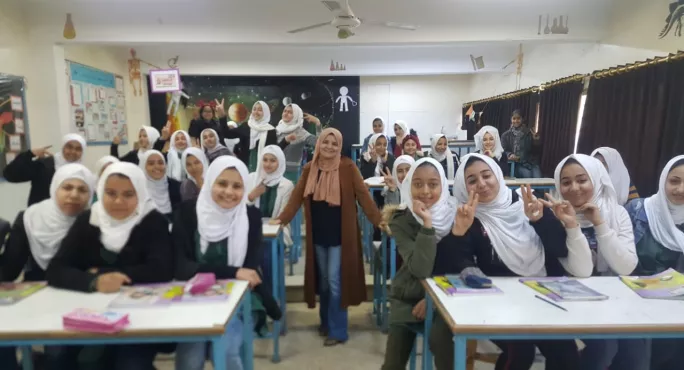I teach at one of the United Nations Relief and Works Agency (UNRWA) schools for Palestinian refugees. My school is called Irbid Town Preparatory Girls’ School and we share our school building, situated in Irbid, north of Jordan, with other refugee schools.
We work in a two-shift system due to a lack of funds and a large number of students. My students - 900 girls aged between 6 and 16 - start the day at 6.45am and finish at 12.30pm. The afternoon shift finishes at 5pm.
First on the timetable is exercise in the school yard, and speeches from students who are in the school parliament. We then have morning lessons, 15 minutes for lunch - not long enough to eat a whole meal, but they do have snacks - and then they go back to lessons for the rest of the morning.
In a typical day, I teach physics and basic science for students aged between 10 to 16, and teach 26 classes per week. It takes a great effort.
The school is in the centre of the city, I usually drive for 20 minutes to get there. The students come on foot as most of them live in the Palestinian refugee camp near the school. This camp was established in 1951 after the conflict in the West Bank.
My students suffer from several challenges both inside and outside of school. At home there’s poverty, lack of minimum living wage and the threat of an early marriage.
Within school, there’s overcrowding in the classroom - each class has around 50 students. But that does not stop us from giving them the best education possible. We try to give them them the hope that they won’t be in this situation forever.
After the end of the school day, I usually train students to design and program robots. About 50 students applied to join the robot club but unfortunately because of the limited time and space only a specific number are trained to participate in the competitions.
Most of my students don’t have telephones or computers in their homes, but in the Science-Robot Club at school I teach them how to make and program a robot.
Many students are interested in learning about programming robotics because they know the importance of this new science and its impact on their future. Each year my students participate in national and Arab robotics competitions and achieve outstanding results.
Once the school day ends, I make a plan for the following day.
My favourite thing about teaching is working with young students: their energy is contagious. But I find it so hard to deal with the humanitarian situations my students who have come to Syria face, and the unfair working conditions because of the lack of financial support for schools.
Jordan is a country with limited resources and yet we’ve received many waves of migration due to conflicts in the Middle East. This has led to the large increase in the number of students, putting tremendous pressure on teachers and on schools.
We’re trying to maintain a high level of education in the country, and it requires concerted efforts of the international community and the provision of aid to education.
The burden on any refugee teacher is massive, and I wish we all had access to psychological support to help us.
But we try our best with what we’ve got.
Samar Nazzal teaches science in Irbid Town Preparatory Girls’ School 3, Irbid, Jordan

